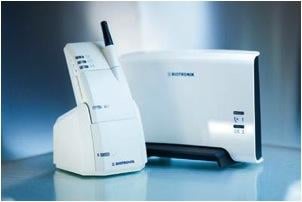
January 27, 2014 — An Effectiveness and Cost of ICD Follow-Up Schedule with Telecardiology (ECOST) study indicated the Biotronik Home Monitoring may reduce follow-up costs in patients with implantable defibrillators (ICDs).
Over a 27-month follow-up period, ambulatory costs were reduced and hospital costs were not significantly different in the French National Health Insurance system, according to the report. Adding ICD costs to ambulatory costs, savings amounted to about $430 per patient per year, including remote monitoring service costs.
ECOST was a prospective multicenter clinical trial designed to examine the safety and efficacy of remote monitoring of ICD patients with Biotronik Home Monitoring. The study analyzed 433 patients from 43 sites throughout France who were randomly assigned to remote monitoring follow-up or standard in-office care. The 221 remote monitoring patients were seen in the ambulatory department once a year, unless remote monitoring reported a technical or clinical event requiring an in-office visit. The 212 control group patients underwent in-office visits every six months.
French National Health Insurance fund's actual billings provided cost calculations, which considered hospital costs for management of cardiovascular disorders and ambulatory costs, including costs related to device management and other ambulatory costs. By reducing shocks, Biotronik Home Monitoring can prolong battery life and reduce rate of replacement. The cost savings shown in the 27-month study are expected to increase over time.
The economic analysis of the ECOST study did not take into account physician fees for remote monitoring, as they are not yet reimbursed by the French National Health Insurance system. French authorities are currently negotiating how to reimburse physicians for remote follow-ups. Expenses saved by Biotronik Home Monitoring could reimburse remote physician services to provide patient care at no additional cost to the French health care system.
For more information: www.biotronik.com


 July 22, 2025
July 22, 2025 



